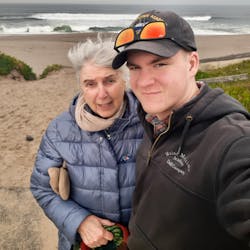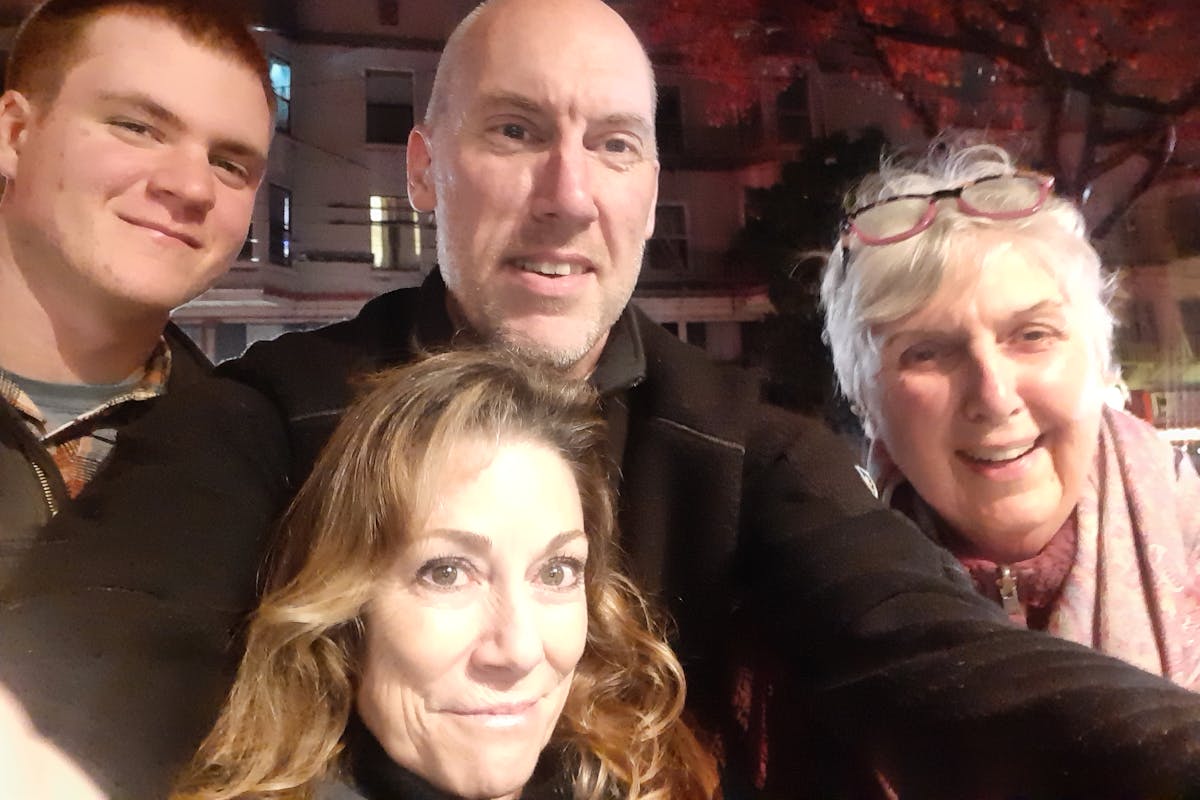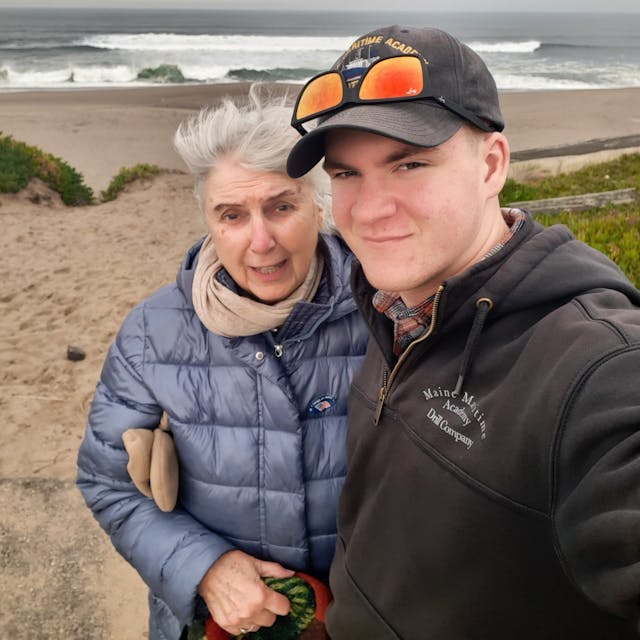Answering The Call
8 min read

Serving Faithfully, Supported Generously: The Gift of The Christmas Fund in Retirement

by Joan Smith
The Rev. Joan Smith, a retired UCC minister, discusses her passionate call to serve, the differences she made in ministry, her mixed feelings surrounding finances, and the positive impact of UCC programs like The Christmas Fund and Annuitant Visitor Program.
Drawn to Serve
I was originally a high school guidance counselor in New England, but I felt a deep calling to pastoral ministry. After speaking with divinity schools and ministers, the last minister I interviewed gave me some tough advice: “This is the hardest job you could have. If you can do anything else to use your gifts, do that.” Despite this, I couldn’t ignore my calling. Seven years later, through a unique program, I was ordained. I took several courses, including preaching in a Harvard off-campus seminar.
My final attempt at going back to school for ordained ministry took me to Andover-Newton in Boston. At this time, I was working as a program manager at a Quaker Foundation in Vermont focusing on diversity and anti-racism work, helping people go beyond the mental boundaries they had against women. When I reached out to Andover-Newton, a minister advised against committing to three years of divinity school because it would repeat concepts and skills I already understood. Instead, I took a couple courses on preaching from Bangor Seminary.
Impacting Congregations as an Interim Minister
I was allowed to serve as an interim minister because I had a master’s degree, and you could be an interim minister as a licensed pastor without being ordained. For a woman who had become ordained through an alternative route, there was often a stigma around my position. If I went to a clergy gathering, which was usually mostly men, the first question people asked was where I went to seminary. I had to explain that the Vermont Conference Committee on Ministry had crafted an independent path for me.
I was very skilled at interim ministry – my call ended up being as an ordained interim minister dealing with what wasn’t working within a congregation. The concept of developmental ministry started to form, meaning that we’d go into a church with the purpose of restructuring it. I took a course on interim ministry offered by the UCC, and I remember having wonderful conversations with one older woman. I was able to talk to her about what it’s like to fall in love with a church and then have to leave, and how to prepare for the leave-taking.

The Positive Effect of Annuitant Visitors
While I was working as a minister with churches on the coast of Maine, I was visited by an Annuitant Visitor, the Rev. Dr. Dick Snyder. He got me involved with a restorative justice program that he started on the coast of Maine. I was so surprised that he was visiting me out of concern for my ministry. I’m still brought to tears because I remember thinking, “Wow, somebody is interested?” He checked in about how I was surviving and how I was able to live.
Talking About Financial Shame
In 2010, I was working part-time in a small island church while offering retreats out of my home on the coast of Maine, a program called Healing Soup. I went to a small business class in town. The instructor went through my financial books and said, “Joan, this isn’t working.” I said, “What do you mean? It’s working, I’m earning exactly what I need to pay for everything.” He said, “But you’re not making a profit.” I never thought in terms of retirement or financial excess – I just figured I worked until I dropped.
Dick Snyder asked if I would be willing to receive a gift from the conference. When he suggested that, I felt a little ashamed. This shame wasn’t just felt by me – I started offering discussion groups for clergy who were thinking of retiring, but even the ones who asked me if I would do a group like that ended up not coming. There was a shame that was hard to name surrounding the fact that we were in a position where we might need financial help. So, I helped facilitate several clergy support groups over the years. If the group was mostly men, they tended to feel they needed to hide things that weren’t working and talk instead about what they were accomplishing.
“It’s wonderful to feel cared for. The amount of the help is not as important as the fact that there’s a tangible way the collective church wants to strengthen your foundation.”
Learning and Sharing The Christmas Fund
Back when I was in Maine, Dick Snyder visited me and told me about The Christmas Fund. There were questions surrounding life insurance and my retirement – the churches I served weren’t big on retirement, so I’ve been blessed to receive what feels like a substantial “we trust you” gift from the UCC since Dick visited me. Another Annuitant Visitor saw me after I moved to California and said, “I’m here to see if you need anything.” I said, “Well, not right now,” because I had already received that incredible gift. The Christmas Fund gifts made me feel like it was okay to do volunteer work for a year in different areas that mattered to me.
I have also recommended The Christmas Fund for others. There was a spiritual director who used to be one of the Conference Ministers for the UCC in Vermont. He had retired, and he didn’t have much money. He was an amazing worker and mentor for many of us, so I called the UCC and asked if they would look into this reverend’s financial circumstances. I thought he certainly deserved some financial help getting into a retirement home through The Christmas Fund. They agreed, and so he was able to die peacefully in a retirement home at the age of 90.
Words to Those Who Donate to The Christmas Fund
It’s huge that somebody cares. Again, ministry can be a very lonely job, strangely. It’s definitely lonely in terms of where you might be struggling. Emotional and mental health challenges are very connected to financial dilemmas. I’ve known a lot of clergy to have faith crises – you’re supposed to be right there and strong, but you can’t always be that person. So, to have somebody from the church is amazing. It’s the fact that it’s collective, it isn’t just your local church that’s caring and concerned. I remember when Reverend Denham, an Annuitant Visitor, came to visit me five years ago. I thought, “You really want to know how I’m doing?” It’s wonderful to feel cared for. The amount of the help is not as important as the fact that there’s a tangible way the collective church wants to strengthen your foundation.
The Christmas Fund: Caring for Church During Times of Challenge
Gifts to the Christmas Fund have provided essential financial resources for active and retired clergy and lay employees of the United Church of Christ for over 100 years by way of emergency grants, pension and health premium supplementation, and Christmas “Thank You” gift checks each December to our lower-income retirees.

by The Rev. Joan Smith
After a career in high school teaching and guidance, spiritual direction, and retreat leadership, the Rev. Joan Smith was called to Licensed, then ordained Interim Ministry in 1999. Through seven churches in Vermont, Maine, and California, Joan was a midwife as churches engaged with race, civil union legislation, Open and Affirming, gender identity, boundary and trust issues, reorganization, growing, and closing.
Be open to the leading of the One who is accompanying you through this, and in all, of your journeys.Rev. Dr. Martha M. Cruz
RELATED ARTICLES
Giving and Receiving
The Christmas Fund: Providing Vital Support During Challenging Times
POPULAR RESOURCES
"...the GLORY of GOD shone around them..." - The Christmas Fund
The Christmas Fund has been caring for active and retired clergy and lay employees of the United Church of Christ for over 100 years, providing emergency grants, supplementation of small annuities and health premiums, and Christmas “Thank You” gift checks each December to our lower-income retirees.
Emergency Grants: When the Unexpected Happens
Sometimes those who serve the church encounter unexpected situations that present financial challenges. The UCBMA offers emergency grants for active or retired clergy, lay church workers, and Members in Discernment.
